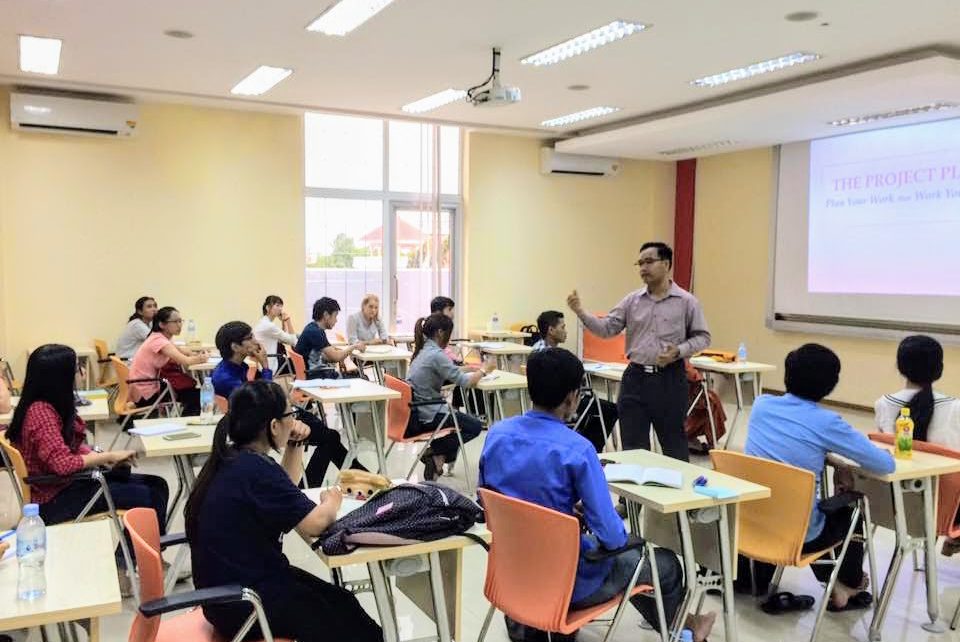Context: Mismatches between the education system and the labour market mean that some 44.5 per cent of young people employed in Cambodia in 2014 were undereducated for their job, while 5.6 per cent were deemed overeducated. Unemployment is higher among young persons with tertiary education (7.3 per cent) than among those with lower levels (2.4 and 1.6 per cent for those with secondary and primary education, respectively). Nevertheless, tertiary educated youth transition faster to a stable job (1.7 months) than those with only secondary (4.1 months) or primary (8.8 months) education. According to ILO School-to-Work-Transition Surveys, the share of informal employment in 2014 stood at 95.5 per cent. Some 50.8 per cent of young employed people were unpaid family workers, while 16.3 per cent were own-account workers. Young men were more likely to work in agriculture than women (50.7 per cent and 44.1 per cent, respectively), while women were more likely to work in services (33.3 to 27.8 per cent).
Implementation of programme/ initiative: The Enrich Institute (EI) is pro-green growth NGO engaged in research, capacity building and policy dialogue in the areas of social innovation, youth development, energy and climate research, and sustainable water resources. EI has established partnerships with numerous international organizations including The World Bank, UNDP, USAID, The Asia Foundation, and Voluntary Services Overseas (VSO). EI has also conducted research and training services for local organizations including Cambodian government agencies, the NGO Forum on Cambodia and local universities.
The Enrich Youth Employment Program (EYEP) is an initiative established in 2015 by EI to promote youth employment in Cambodia, and is funded inter alia by EI itself and Zaman University. EYEP was one of the nine best youth-related initiatives that The Abraaj Growth Markets Grant selected for funding in 2015. EYEP implements its goals through a multi-pronged approach, namely: 1) improving workforce quality through capacity building, 2) connecting job seekers to potential employers, and 3) offering career advisory services to working youth to improve their job performance.
EYEP’s training programmes focus on both soft skills (leadership, teamwork, creativity and problem solving) as well as work-related skills (computer and financial literacy, and facilitation and networking skills). Upon completion of the theoretical course, trainees get involved in practical job experience through paid or unpaid internships, short-term volunteer work or job shadowing. Trainees that have successfully completed both training components are placed in paid full- or part-time jobs using EI’s wide network of private sector partners. EYEP follows up with former graduates every three months to ensure optimal job performance.
Main challenges: Since its inception, the main challenge faced by EYEP has been securing sufficient funding. The first round of training was funded by donors, but EYEP is aware of the need to secure additional sources of funding, including cost recovery schemes from trainees themselves, in order to achieve financial self-sustainability over the mid- and long-term.
As of 2017, EYEP only operates in Phnom Penh. Consequently, an important challenge faced by the programme has been the difficulty to reach out to youth in the rural areas, mainly due to lower access to information. In addition, interested candidates living in the provinces cannot afford the time and cost involved in moving to Phnom Penh to attend training courses.
Results achieved: The goal that EYEP set up for itself for the first year was to train 100 young men and women and secure employment for 70 per cent within six months. The first round of EYEP capacity building training, completed in July 2016, succeeded in reaching this goal. A total of 90 students (42 per cent young women) completed the course and 95 per cent were fully employed by December 2016. EYEP graduates found jobs in private educational institutions, banks, research centres and telecommunication companies.
Closely related to EYEP, EI has also set up the Centre for Youth Development (CYD) that trains young Cambodians to become the next generation of leaders through active participation in their communities. As of 2017, CYD has trained hundreds of young people and reached out to thousands through its satellite programmes.
Moving Forward: EI is exploring new sources of funding to ensure the financial self-sustainability of EYEP. Thus, during 2017 EYEP plans to introduce cost recovery schemes for its capacity building, networking and career advisory services by charging fees to attending trainees and graduates that have already found a job. Nevertheless, EI continues to seek collaboration and financial support from international organizations, foreign government aid agencies, private donors and international NGOs to offer EYEP services free of charge to young people from disadvantaged backgrounds. EI also plans to discuss with relevant Cambodian government agencies working on youth development ways to formalize and consolidate EYEP.
Replicability: As EYEP began implementation in 2015, there has been no opportunity for it to be replicated yet. Once the first round of training is concluded, EYEP plans to produce and share a summary of the lessons learned that could be useful for other organizations involved in facilitating the school-to-work transition in Cambodia and elsewhere. Several of its features (e.g., its comprehensive and multi-pronged approach to youth employment) represent innovative approaches in the promotion of youth employment. EI will discuss with the Cambodian Ministry of Labour and Vocational Training and the Ministry of Education, Youth and Sport on how to consolidate EYEP in Phonm Penh as well as to explore possibilities to replicate it beyond the capital to benefit unemployed youth in the provinces.
References:
1) Background Information on Cambodia’s school-to-work transition. Cambodia’s School-to-work Transition 2012-2014 Survey (2016). Cambodia’s National Institute of Statistics and International Labor Organization (ILO).
http://www.ilo.org/wcmsp5/groups/public/—ed_emp/documents/publication/wcms_537749.pdf
2) EYEP official website: http://www.enrichinstitute.org/youth-employment.html
3) ENRICH Institute official website: http://www.enrichinstitute.org/
Acknowledgments:
This good practice was kindly prepared by Dr. Antonio Postigo
Project Details
Date: March 20, 2017
